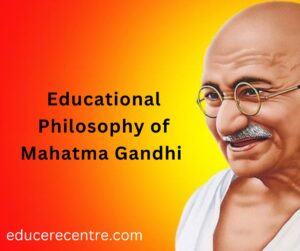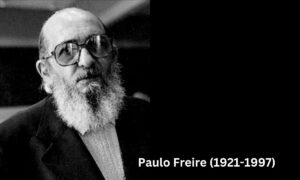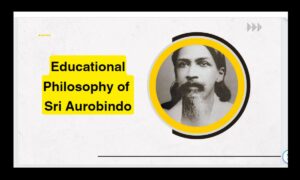Rabindranath Tagore (1861-1941) was born in Calcutta, Bengal. He is known throughout the world for being Asia’s and India’s first Nobel Laureate for his Book Geetanjali in the year 1913.
Tagore started writing poetry at the age of eight his poems started getting published in a Bengali Magazine, Bharati, under the pen name of Bhanusimha. Rabindranath’s poetic career reached the zenith with his book Gitanjali, for which he was awarded the Nobel Prize. He established Shanti Niketan in 1901 and later it expanded into Vishwa Bharati University.
Fundamental of Rabindranath Tagore
- Rabindranath asserted that the educational system that the British Empire had enforced on India was meant only to train individuals to work as clerks, and to inculcate in them a feeling of inferiority for their own culture and philosophy. For this reason, Tagore advocated for an education system in India that was independent of Colonial British
- This idea of his gave birth to Shanti Niketan, which was based on Ashram-style education. Here, Education was provided amidst natural surroundings and based on the principles of freedom, faith, cooperation and happiness.
- He opined that a student’s education would be more effective if educational institutes were situated in naturalistic surroundings
- His first significant write-up in this direction is Tapovan (1901). In this article, Tagore introduced a new idea of the education of feeling
- His non-authoritarian Education for international understanding is best understood through his poem “where the mind is without fear”
- He asserted that along with education, economic upliftment is also necessary. Therefore, he suggested that educational institutionss must have a close association with economic life. He said “ Our university must not only instruct, but live; not only think, but produce”
- Rabindranath Tagore envisioned Vishva Bharati University, as a learning centre where conflicting interests are minimal, where individuals work in cooperation with the common pursuit of truth. He envisioned good fellowship and cooperation between the scholars of both Eastern and Western countries.
Educational philosophy of Rabindranath Tagore
Aims of Education
- Self-Realization: Spiritualism is the essence of humanism; this perspective is reflected in Tagore’s educational philosophy.
- Intellectual Development: Development of different mental faculties i.e., memory, creativity, imagination, thinking, logic, discrimination between right and wrong and problem-solving
- Physical Development: Tagore’s educational philosophy also aims at the physical development of the child. He gave much importance to sound and healthy physique. There were different kinds of exercises. Yoga, games & sports are prescribed in Santiniketan as an integral part of the education system.
- Education for cultural development and universal brotherhood: Tagore held that the entire universe is one family. Education can teach people to realize the oneness of the globe. Education for international understanding and universal brotherhood is another important aim of his educational philosophy. The feeling of oneness can be developed through the concepts like fatherhood of God and the brotherhood of man all creatures are equal on this earth.
- Moral and Spiritual Development: Tagore emphasized moral and spiritual training in his educational thought. Moral and spiritual education is more important than bookish knowledge for the integral development of human personality. There must be adequate provision for the development of selfless activities, cooperation and love fellow feeling and sharing among the students in educational institutions.
- Social Development: He said, “Service to man is service to God”. All should develop social relationships and fellow-feeling from the beginning of one’s life. Education aims at developing the individual personality as well as social character which enables him to live as a worthy being.
- Vocational Development: Education should develop vocational skills among students so that they can earn their livelihood.
- Education for Women: In ’Strisiksa” (1915). The education of women, Rabindranath Tagore writes” Whatever is worth knowing is knowledge. It should be known equally by men and women, not for the sake of practical utility that for the sake of knowing”
Also Read : Educational Philosophy of Mahatma Gandhi
Curriculum
- Diverse Curriculum
- Activity-centered curriculum
- Teaching through mother tongue: Language is the true vehicle of self-expression. Man can freely express his thoughts in his mother tongue or Lingua Franca. Tagore has emphasized the mother tongue as the medium of instruction for the child’s education.
- Including regional and foreign languages, study of culture, arts, co-curricular activities, sports, games and drama
- Vocational Skills: The activity-centred curriculum that he designed for Shantiniketan in the beginning included: –
- Subjects: Mother tongue, Sanskrit, history, geography, English, Study of nature, pure science, arts, humanities and music
- Productive activities: Agriculture, gardening, regional study, field tours, review of different literary articles and laboratory work
- Other Activities: These include sports, music, dramatics, dance, creative writing and social work
- Presently, Vishva Bharati University has become a prominent centre for international liberal and technical education
Method of Teaching
- Opposed the bookish learning method
- Contextual method
- Activity centred
- Demonstration
- Learning through self-experience
- Inductive learning
- Learning through observation
- Walk the talk, in nature
- Oral Method
- Self-study method
- Analysis and synthesis method
- Field tour and playway method
- Experiment Method
Role of Teacher and students
- A teacher should be of high character and ideal conduct
- Well-learned, patient and devoted to the students
- Recognize individual differences of the students and deal with them accordingly i.e. with love, care and sympathy
- Develop nationalistic and internationalistic spirit in students
- The relationship between the student and the guru should be congenial
- Students should follow celibacy, sensual control, purification of mind, speech and actions, and lead a simple and natural life
- They should be curious and intrinsically motivated to attain both worldly and spiritual knowledge
- Cultivate concentration and practice mediation
Role of School and Discipline
- Discipline should not be exercised through external force, but it should be intrinsic i.e., self-discipline
- Vehemently opposed corporal punishment
- For the development of the discipline, he considered the inclusion of sports, yoga practice and cultural programs in the schools.
- Rabindranath Tagore stated that schools should be situated in the lap of nature, away from the noise and hustle of the city


